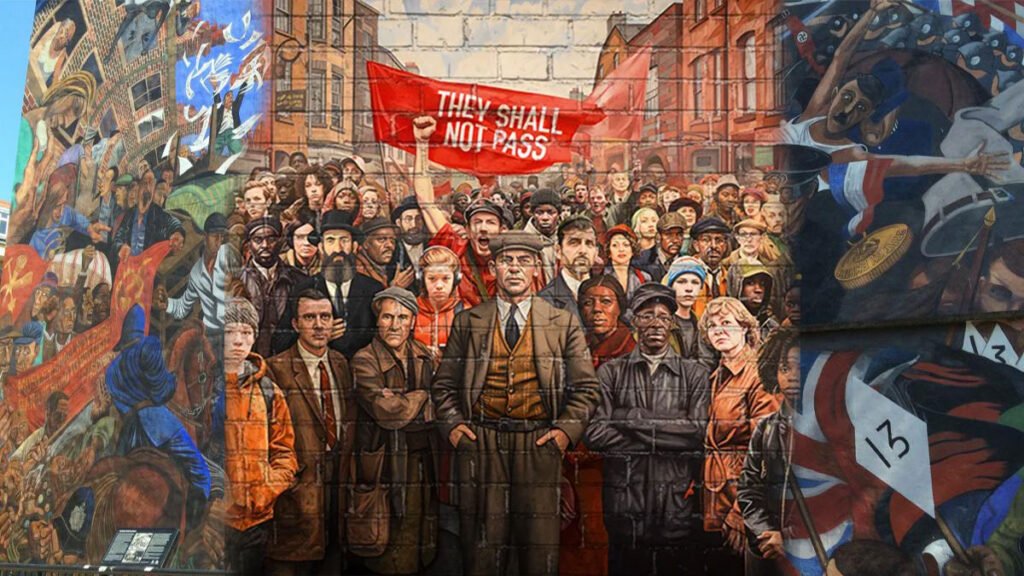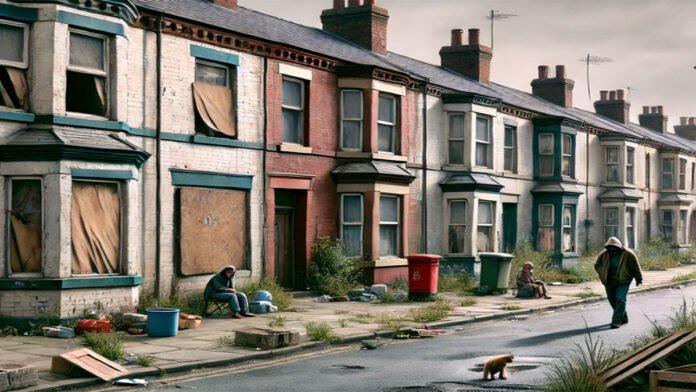Guest post by Jack Morriss
We need to isolate fascists from the deprived and downtrodden
The riots that have swept across England and Northern Ireland have not taken place in a social vacuum.
Descriptions of mindless violence and criminal thuggery give the impression that the riots have come out of nowhere or are the sole outcome of fascist agitation.
There can be no doubt that a loose set of neo-fascist actors, either through physical organisation on the ground or via online encouragement through popular apps like Telegram, have played a significant role.
The attempt to set fire to a hotel housing asylum seekers in Rotherham, which was still occupied at the time of the attack, could be viewed as arson with intent to endanger life. This crime rightly carries a potential sentence of life imprisonment for all those involved.
Further evidence has now been presented by ITV and others that convicted fascist terrorists associated with proscribed groups are at the heart of some of the violence.
These fascist elements must be opposed by the working-class movement, and solidarity should be extended to all those who have been targeted, whether they are worshippers at mosques, those who have been attacked in racially aggravated assaults, or those whose homes or cars have been damaged because they are not white.
People who have committed violent crimes must be punished accordingly, and it is important that victims see a degree of justice served.
However, dealing with the long-term problems that the riots have revealed will take more than simply punishing those who have taken part, particularly those who committed non-violent offences such as looting.
When the riots happened in 2011, there was a concerted attempt by those on the left to understand the social conditions that led to the violence. At the time, the effects of austerity were one of the driving forces behind why so many took part.
The 2011 riots did see attacks on police, journalists, and the burning down of businesses. But those individuals who were not involved in serious disorder and instead stole a pair of trainers from sports stores while they were ransacked were still given custodial sentences.
Punishment Isn’t Enough: Addressing the Conditions That Breed Fascism

This week, following the hard-line rhetoric from Prime Minister Starmer, who made little to no distinction between those organising and committing the most violent acts and someone taking sausage rolls from Greggs, it is likely we will see similar “swift justice” in the coming days and months.
Punishment needs to fit the crime, and due to the scale of the riots and the tacit support some of the unfolding events have received, it is clear that a wholly legalistic or moralistic approach will be inadequate.
We have had 14 years of Tory austerity, Covid, and an explosion in wealth inequality with more billionaires than ever. In the meantime, getting a decent work contract, an affordable living arrangement, and reliable public services is out of reach for millions in Britain.
It is no surprise that within this social decline, the seeds of fascism and racism begin to find fertile ground.
Issues like immigration are part of the conversation that multi-ethnic working-class communities are having, whether people like it or not.
A traditional left position has always been to support a humane immigration policy but to be resolutely opposed to globalisation or open borders and against the brain drain from the developing world.
Immigration has always been a facet of Britain over the centuries, but people are now coming to our shores, taking highly perilous journeys fleeing imperialist wars and neo-liberal economic policies that have devastated their countries.
Due to a dire economic climate and shortages in housing and local services, it is inevitable that people on the receiving end will seek blame, aided and abetted by a right-wing media looking to scapegoat migrants for all our ills.
The answer to these problems is not to dismiss the immigration concerns of working-class communities out of hand but to engage in the debate. It is not only correct to do so, but it is something the political right, in varying shades, is discussing every day with their target audiences.
To foster a tolerant environment, you have to make the economic circumstances favourable—secure permanent jobs that are well-paid with decent conditions, build modern council housing, and have good local public services.
Cross-community cohesion is something that requires work too. There needs to be respect for difference, but also shared public facilities and spaces that everybody feels they have a stake in.
Lessons from Cable Street: Isolating Fascists Through Community Action

This is part of what lies at the heart of the tacit support for the riots.
Ordinary people, many of them part of an underclass in Sunderland, Rotherham, and Middlesbrough, have very little to look forward to. The devastating effects of de-industrialisation from the Thatcher period are still keenly felt. When hundreds of thousands of people in these deprived communities have no real stake in society, some of them will allow their frustrations to boil over into destructive disorder.
The working-class movement must draw a distinction between those who have committed serious violent crimes and engaged in fascist agitation, and those who loot a corporate store for sausage rolls or makeup.
We cannot afford to simply mirror the line of the government and call for further draconian measures, which will no doubt be used against us when we want to take direct action or engage in civil disobedience.
The battle for hearts and minds is at a critical juncture, and our approach should have a basis in historically successful anti-fascist work.
The Battle of Cable Street in 1936 is often cited as a moment when militant anti-fascist forces physically defeated Oswald Mosley and his British Union of Fascists (BUF). However, what is not talked about as much is the intensity of the community organising that went on in the lead-up.
Phil Piratin, then a notable member of the Stepney Tenants Defence League, spoke about their approach during a 1986 interview. He detailed how two families were going to be evicted from their homes by their respective landlords. The two men in the households were Oswald Mosley supporters. But by helping them with their rent arrears, Piratin points out that they were able to canvass the locals, telling them the BUF had done nothing. This helped to drive a wedge between the BUF and the local community.
Piratin, who would go on to become a Communist councillor, said: “There were those among the fascists or their sympathisers who were ordinary decent folk that could be won over. Therefore, there had to be a very important effort to discriminate between the hard-line thugs of the fascists and the ordinary people who were attracted to their propaganda.”
Guest Article by Jack Morriss
Support Independent Journalism Today
Our unwavering dedication is to provide you with unbiased news, diverse perspectives, and insightful opinions. We're on a mission to ensure that those in positions of power are held accountable for their actions, but we can't do it alone. Labour Heartlands is primarily funded by me, Paul Knaggs, and by the generous contributions of readers like you. Your donations keep us going and help us uphold the principles of independent journalism. Join us in our quest for truth, transparency, and accountability – donate today and be a part of our mission!
Like everyone else, we're facing challenges, and we need your help to stay online and continue providing crucial journalism. Every contribution, no matter how small, goes a long way in helping us thrive. By becoming one of our donors, you become a vital part of our mission to uncover the truth and uphold the values of democracy.
While we maintain our independence from political affiliations, we stand united against corruption, injustice, and the erosion of free speech, truth, and democracy. We believe in the power of accurate information in a democracy, and we consider facts non-negotiable.
Your support, no matter the amount, can make a significant impact. Together, we can make a difference and continue our journey toward a more informed and just society.
Thank you for supporting Labour Heartlands









